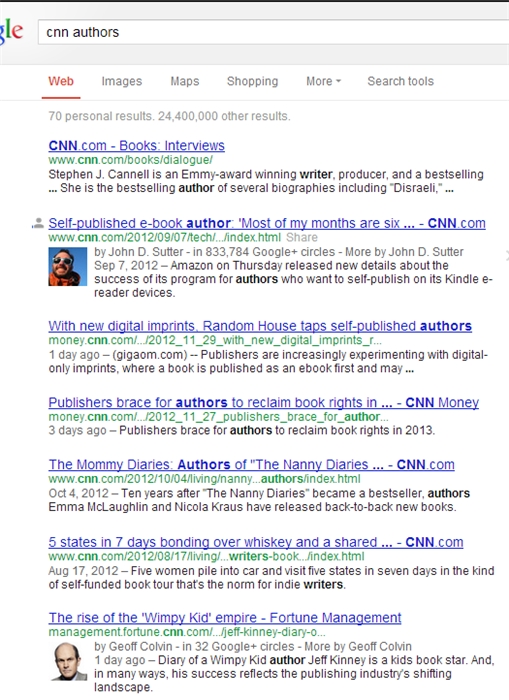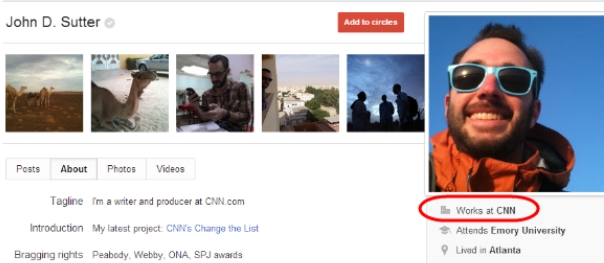 Look how old this is!
Look how old this is! I post at SearchCommander.com now, and this post was published 12 years 11 months 5 days ago. This industry changes FAST, so blindly following the advice here *may not* be a good idea! If you're at all unsure, feel free to hit me up on Twitter and ask.
Sometimes, paid links may be totally alright with Google, and in fact in many cases are EXACTLY WHAT THEY’RE LOOKING FOR.
Let me explain…
If I search Google for “CNN author on Google plus” then I get over 22 million results, with John D Sutter showing as #1

John Works for CNN, and he even says so in his profile. Presumably work is exchanged for money, and not related to any sort of link. CNN is listed as his job, there is no link in that spot anyway.

So where’s the link?
Buying Authorship
This is where it gets tricky. John has also listed CNN on the About page of his Google profile as a contributor. In other words, he places a link – in fact, four links – there, and there’s no way to tell if he’s been paid.

CNN,being the savvy organization they are, of course has the correct Google rel-author code on their website that enables the users search results to appear with a picture for anywhere that John is that the creator of the content.

Was John given extra money for this link? Is it a part of his employment agreement that he has to? Or did he just list these four deep links to CNN because he’s justifiably proud of his content and wants the world to know he contributes?
We really don’t know, and it doesn’t matter. He IS a credible source, he IS a contributor, and whether he takes money or not, or exactly what it’s for, is irrelevant to Google..
Better Rankings?
Having this image, along with the sort of “user verified content” in the search results of course helps attract eyeballs and most SEO folks I know also believe it helps rankings, but just to be clear, someone does NOT have to say that they “work there” on their profile to make this magic happen.
CAN they be employees? Certainly. But MUST they be disclosed as employees? Nope, they sure don’t. All they have to do is place the backlink under “contributor to”, and if the right code is on the site, bam, you’ve got more credibility.
Great content is not enough… Who actually wrote it?
Google is placing a huge amount of credibility on WHO writes the content, and the accompanying visibility of the author photo in the search results is supposed to be an indicator to the end-user that this is a credible and validated piece of content through the Google universe. It’s credible because they say so.
I can hire someone to write the content for my site, and if it’s well written completely excellent stuff, then I will be welcomed by Google with open arms. There’s no guarantee of course that they’ll rank me for anything, but this is completely “white hat” and legitimate in the white hat section of anybody’s SEO playbook no matter how strict.
It’s ALSO perfectly white hat t ohire a credible author and give them credit, and that’s what’s happening, with freelance industry experts all over the place.
This Agent Rank algorithm was first patented by Google in 2005 , and this “validation process” is part of what’s ultimately led to the creation of Google + over time.
You may also have heard this “author power” being referred to over the past year as “author rank” or Google Authorship, and it’s become so important in SEO that we devoted an entire meeting to the subject last month at SEMpdx courtesy of +Mike_Arnesen (I just LOVE his G+ cover photo – wish I’d thought of it)
Good Authors Add Credibility – Get it?

If Stephen King were to provide content for my mystery bookstore website, and then listed himself as a “contributor to” on his Google+ profile, wouldn’t (in fact shouldn’t) that boost my domain ranking as well as my click throughs?
Imagine a photo of Cesar (the Dog Whisperer) Milans was appearing next to my local pet store result in a dog related search for a training piece he wrote? Doesn’t the content written by him have “expert” status, and deserve to rank higher?
What if I hired Tyra Banks to write for me, and then had her picture showing in the SERPs for a makeup company or diet and beauty products, wouldn’t that be a strong signal to the user (and to Google) that this is “good stuff?
How about if I enticed @Graywolf or Danny Sullivan or Matt Cutts or any other industry thought leader to write some amazing insights, and posted on my blog, verifying their authorship? Think that might help my domain?
Is Authorship For Sale?
Remember, Google actually created the entire underground link buying economy in the first place – so doesn’t this seem like pretty much the same thing all over again?
Aren’t they really just creating opportunities for “authors” in every industry to sell out, and peddle their wares?
Of course they are, and of course authorship is for sale. You can find countless examples of paid bloggers that do NOT have their occupation listed as the company they write for.
For now, these sort of paid links that come from credible author profiles ARE PERFECTLY OKAY with Google, as evidenced by example after example of search where you know these people are PAID. like this #1 of 24 million results for “psychology writer”.

There’s no Google WebMaster Guidelines requirement or even any hinted suggestion that being a paid “contributor to” at Google+ needs be disclosed. There’s no secondary field to add a “paid contributor to” link that gets no-followed, and perhaps there never will be. Selling your own author rank might remain perfectly okay!
I think Google’s theory is that its going to be self policing… If content is going to be out there with someones name and face on it, and it’s validated back to their Google+ profile, then it’s going to be of a higher caliber, better quality etc. – and if not, then Google will just diminish the value of the author rank their their profile can pass pass.
Where Can You Find Someone For Sale?
So far, the best way I’ve found to find these “birds of a feather” authors if you will, is at the oh-so-cleverly named “Find People on Google Plus” where they let you search by different criteria, the show you a count of how many people follow them, how many they follow, and they even add their own little clout (not to be confused with Klout) score too. It’s still a bit rough, and it could use the ability to sort by score, and their follower / following counts are WAY outdated, but it’s pretty cool.
Just like paid link networks came along years ago, I’m sure we’ll see a new type of content available soon, where you’re not just outsourcing your content, but including authorship and addition under “contributor to”.
Perhaps there will be a site something like Template Monster for authors, where writers not only do ghostwriting, but showcase their content and sell it via an auction?
Or, perhaps it will be available from Google themselves as a new revenue generator – The Google+ Author Marketplace – sort of like their “Trusted Store or Trusted Photographer program?

What do you think? Would someone that contributes to a site for a fee have to disclose that on Google+? And if they did, would it even matter?
2014 Update
As of Jan 2014, after writing this I changed the title tag on this page to “Buying Authorship in 2013” – My original title, “Buying Links in 2013” seemed somehow inappropriate 😉



















